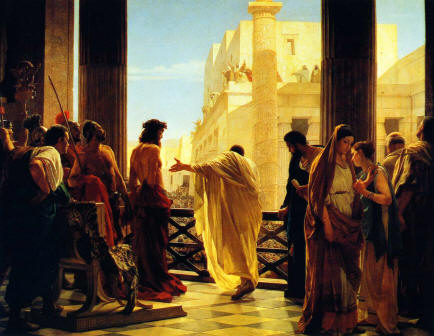This is the first of a two-part post based on a recent Facebook discussion on the Christian and power:
“When religion is too closely linked with power, the problem is not just that religion underwrites oppression, but that the gospel itself is lost. If Christ is just a baby or a dead body, I can keep on living and not allow Christ’s lordship to shed light on all dimensions of my life.” – Ruth Padilla DeBorst
For most of its existence, Christian faith has been aligned with power. Ever since Christianity became the State religion under Constantine in the 4th century, there has been a watering down of the radical social ethics that the Gospel of Jesus demands of us.
Anne Wilkinson-Hayes, of the Baptist Union of Victoria, talks about the impact of Christendom on the faith. They include a change in the way the Bible had to be read (more about that below); marginalising of the human Jesus with a focus on his heavenly character; and a sanctioning of warfare by the church. In short, the persecuted became the persecutors.
Recently I’ve been involved in a brief Facebook discussion based on the above quote from Ruth Padilla DeBorst. The question came up about whether or not we can be a Christian in power. A reference was made to Philippians 4:22 in which St Paul sends a greeting from those Christians in the emperor’s household.
One of the problems of being too closely aligned to power is that we lose our prophetic edge. We become numb to the demands of Jesus as we gradually go along with the allegiances of the State.
It takes huge courage to be close to power and still be prophetic. I think of Daniel who worked with the government of the day. He rose through the ranks but when he spoke out and said something that emperor didn’t like, he was thrown to the lion’s den. It was the same with Shadrach, Meshach, and Abednego; when they refused to worship the golden statue that Nebuchadnezzar set up, they were thrown into the fiery furnace.
When you upset power there are huge consequences. Jesus found that out, as did 10 of the 11 remaining disciples after Judas Iscariot (tradition says that all except John were martyred for their faith). And it has continued down through history, notably in the 20th century when people like Gandhi, Oscar Romero, and Martin Luther King were all cut down for being a threat to the status quo.
Being too closely aligned to power in the sense that Ruth Padilla DeBorst means is to be too chummy with it, such that we lose our prophetic edge. As mentioned above, this is exactly what happened after Constantine became emperor in the early 4th century CE. In 313, Christianity became the State religion and so became aligned with power for the first time.
The result of this was that passages such as the Sermon on the Mount (which was the guiding framework for the first 300 years of the Christian movement) became spiritualised and were interpreted differently. When you’re aligned with Empire, it doesn’t work to love your enemies and say “blessed are the peacemakers.”
Being closely aligned with power in this way is to go along with the program of the Empire. Anne Wilkinson-Hayes tells us of some of the changes that took place in the Christian movement when Christianity became the State religion. For a start, church attendance and tithing became obligatory; large church buildings replaced small ones; and the clergy became professional and hierarchical. Eventually the Gospel of Jesus, the Gospel of good news for the poor, the outcast and the sinner, became lost as the church joined in the mission of Empire. For Empire to be maintained, for power to remain, others need to be put in their place. This is one of the reasons the Gospel became spiritualised (another main reason is to do with the ideas that came out of the Enlightenment).
Power always resists real change. It has a vested interest in maintaining the status quo. This is why we need such movements as Make Poverty History and Micah Challenge to speak truth to power. It is why we speak out about fair trade and unfair work practices. And it is why we put pressure on the powers to force change for the poor.
Power will not make change on its own. History shows that, and it goes against human nature. Hence the need for salvation, for transformation of the human heart as well as of structures and systems that keep people poor. That is why the Christian Gospel makes so much sense, and why Jesus being Lord over all aspects of life is the answer to our problems.
It was because the early Christians worshiped Jesus as Lord instead of Caesar (as Lord) that they were persecuted. They weren’t persecuted simply because they worshiped Jesus; it was because they worshiped him to the exclusion of all others. For the early Christians, if Jesus was Lord it meant that Caesar was not, and that was unforgiveable for the power of Rome.
Stay tuned for part 2 tomorrow…





Leave a Reply